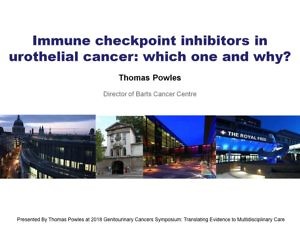Can TMB help select patients for lung cancer therapy or not?

Chicago!
One of the key topics arising out of probably the hottest session (lung cancer clinical trials plenary) at AACR last week was tumour mutation burden (TMB).
An important question to be addressed was whether or not the nivolumab plus ipilimumab combination from the CheckMate–227 study will be useful in previously untreated non-small cell lung cancer (NSCLC) patients with a high TMB?
There are a number of questions that occurred to us that need careful consideration:
- Is TMB ready for prime time?
- What are the challenges and issues involved?
- How useful are the data from CheckMate–227 and CheckMate–568?
- Where are we going next?
To find out more, we had some fascination discussions at AACR with two up and coming young researchers from industry (Dr David Fabrizio of Foundation Medicine) and academia (Dr Nicky McGranahan from UCL in London), who are both experts intimately involved in measuring TMB.
What did they had to say and what does it all mean?
Their candid answers may well surprise a few people…
To learn more and get a heads up on our latest thought leader interviews and oncology insights, subscribers can log-in or you can click to gain access to BSB Premium Content.
This content is restricted to subscribers
 What I wanted to do here was take a step back after the dramatic 1L NSCLC session and pull together some pros and cons that oncologists will be thinking about going forward.
What I wanted to do here was take a step back after the dramatic 1L NSCLC session and pull together some pros and cons that oncologists will be thinking about going forward.
 For what seems the longest time, we have seen the battle in metastatic clear cell renal cell carcinoma (ccRCC) being focused on various anti-VEGF TKIs, whether against interferon, mTOR inhibitors, and even each other.
For what seems the longest time, we have seen the battle in metastatic clear cell renal cell carcinoma (ccRCC) being focused on various anti-VEGF TKIs, whether against interferon, mTOR inhibitors, and even each other. At the 2018 ASCO Genitourinary Cancer Symposium, one of the standout keynote lectures was from Professor Tom Powles, Director of the Bart’s Cancer Cancer Center in London who talked about
At the 2018 ASCO Genitourinary Cancer Symposium, one of the standout keynote lectures was from Professor Tom Powles, Director of the Bart’s Cancer Cancer Center in London who talked about 
 It was therefore no surprise to hear Merck’s
It was therefore no surprise to hear Merck’s 
 Yesterday in part 1 (
Yesterday in part 1 (